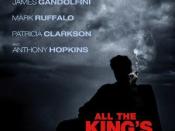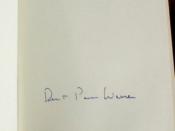Truth Versus Fact In Robert Penn Warren's All the King's Men, the narrator, Jack Burden, has an internal issue concerning the truth versus the facts. This deficiency is demonstrated several times throughout the novel. On such occurrence being the "Cass Mastern"ÃÂ story, and another being the "Case of the Upright Judge"ÃÂ. In these scenarios, Jack has problems differentiating between the truth and the facts.
The first example comes when Jack was still in school, trying to get his Ph.D. in American History. Jack had come into possession of some journals of a fairly distant relative named Cass Mastern. When it comes time for Jack to select a topic for his dissertation, at his professor's suggestion, he chooses to edit and analyze the primary source account of Cass Mastern and his life. When Jack begins his research, and is telling the story to the reader as the narrator of All the King's Men, he becomes completely engrossed with the story, and he tells it at times as if it were his own.
When Jack finally finishes telling the story, he withdraws; he becomes afraid that either he does not understand history, or that the history could be misinterpreted. Herein lies Jack's dilemma respecting facts and truth. Jack describes himself as one who, unlike others, lives in the past in order to escape the present. When Jack reads history, like the Cass Mastern story, he does not see what he reads as truth to be upheld, but merely as facts that could be changed or manipulated. Thus, as he finishes the Cass Mastern story, he looks back upon the tale that he has just completed and sees only words with no life or meaning behind them. Jack then abandons the project and halts all work on his dissertation. He runs away from his link of past to present, as if burning his only bridge home.
The second example of Jack's misinterpretation of facts in the past comes with the "Case of the Upright Judge"ÃÂ. In this case, Willie has asked Jack, as a historian, to dig up dirt on Judge Irwin to bully him into backing Willie or at least withdrawing his support for Willie's opponent. Morality comes into play in this situation because when Jack was a boy, the Judge had acted as a surrogate father for Jack. At the start, Jack is sure that there is nothing to find on the Judge, but as he delves further into the past, he discovers that the Judge was involved in some foul play while he was in the Attorney General's office. The Judge had taken a lot of money in stock options in a corporation in exchange for throwing out a case against them. When Jack discovers this, it does not strike him that in giving this information to Willie he is hurting the Judge. Willie does not see that these facts from the past translate to harmful truths in the present.
In conclusion, Jack, the narrator, does not see that facts that occurred in the past are like truths, he calls them, in the present. He sees past happenings as a fictional story that can be interpreted in any number of ways. The "Case of the Upright Judge"ÃÂ and the "Cass Mastern"ÃÂ story, and the events surrounding them in relation to Jack, show this clearly.





